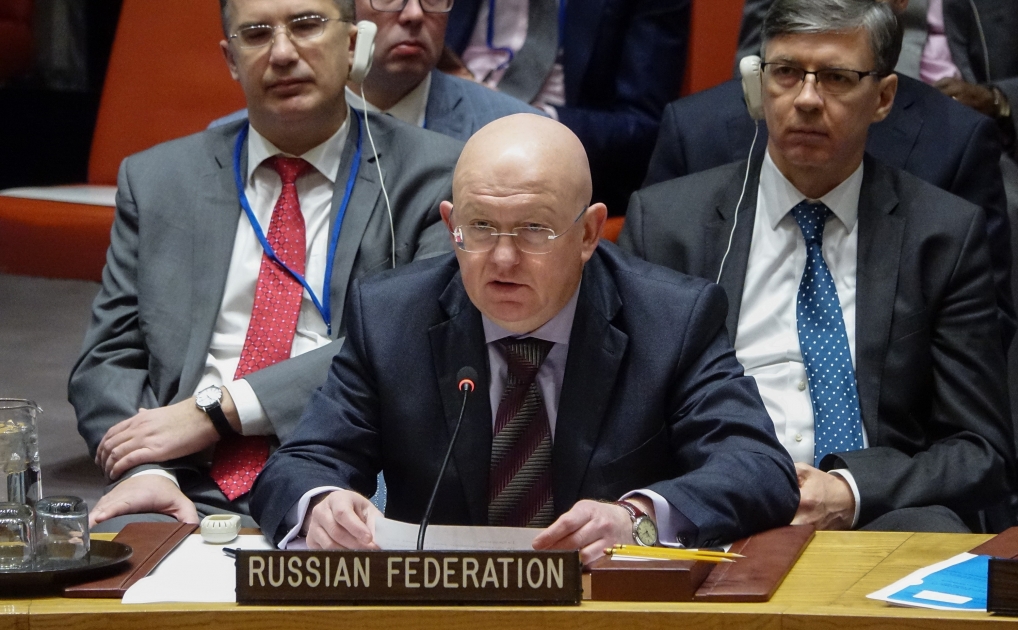Statement by Ambassador Vassily A. Nebenzia, Permanent Representative of the Russian Federation to the United Nations, at the Security Council meeting on the Sixth report of the Secretary-General on the threat posed by ISIL (Da’esh) to international peace and security and the range of United Nations efforts in support of Member States in countering the threat
I would first like to thank you, Mr. President, for convening today’s briefing. We are pleased to welcome Mr. Voronkov, who is now directing the work of preparing the Secretary-General’s strategic reports on the threat posed by the Islamic State in Iraq and the Levant (ISIL).
We studied the report presented today (S/2018/80) with interest. Its conclusions about the military and material suppression of the group’s core in Syria and Iraq inspire cautious optimism.
With regard to the regional aspects of this threat, we are still concerned about the increasing strength of ISIL’s outpost in northern Afghanistan. We must not underestimate the potential of the international terrorist adherents who are gathering there. As the report says, Central Asia is also under threat, and natives of that region have already been observed in terrorist attacks in Turkey, Russia, European countries and the United States.
We concur that the volume of money and other material resources entering ISIL’s coffers has significantly decreased. That does not mean, however, that reports should consider the issue of ISIL’s financial and material support a lower priority. As a result of successful operations of the Syrian armed forces, the support of Russia’s Aerospace Forces, ISIL fighters have lost access to critical oilfields as well as transportation and sales routes.
According to our data, towards the end of 2017 ISIL’s income from illicit oil and gas trading was not more than $2 million a month, while its total revenues in the Middle East had fallen to $3 million. Given the situation, ISIL has actively sought new sources of support, honing its skills in the use of modern technologies. For example, in one of Syria’s neighbours, terrorists’ henchmen are swindling ordinary civilians by setting up fake Internet shops, while the caliphate’s fighters are not above making money from online casinos. As the SecretaryGeneral’s report rightly notes, ISIL’s adherents are proactively using couriers and the hawala system to transfer funds.
Besides that, these criminal proceeds are being deposited increasingly often in accounts at reputable banks in countries in the Persian Gulf, Europe, the Middle East and Central Asia, and Russia recently provided detailed information on this issue to the Financial Action Task Force. When we discussed the Secretary-General’s previous report (S/2017/467), many delegations drew attention to ISIL’s attempts to invest in legitimate businesses abroad. But it also turns out that some Western companies themselves are not averse to doing business with terrorists. We believe that such issues deserve the close scrutiny of the authorities of the countries concerned.
Today more than ever before the issue of subjecting terrorists to criminal prosecution is an urgent one. In accordance with key Council resolutions, anyone who provides direct or indirect assistance to ISIL, not to mention the fighters themselves, should be held accountable. We witnessed yet another failure to abide by that obligation in early January, when the authorities in Syrian Kurdistan made a unilateral decision to pardon some 400 former members of ISIL, including field commanders and caliphate officials, 120 of whom ended up the ranks of the Syrian Democratic Forces.
The fact that events such as these can still go virtually unnoticed testifies to the double standards that persist with respect to terrorists. Unfortunately, resolutions 2253 (2015) and 2368 (2017) are not being fully implemented, particularly where observance of the arms embargo regime is concerned, something that is well confirmed in open information sources.
We trust that those issues will be taken into account when the Secretary-General’s seventh report on ISIL is being drafted. Furthermore, with regard to consideration of the situation on the ground and current trends in the fight against ISIL, we would like to draw attention to the consolidated assessment of future terrorist threats prepared for the annual meeting, held in Russia, of heads of special services, security agencies and law-enforcement organizations.
The next edition will be published shortly as an official document of both the Council and the General Assembly.
